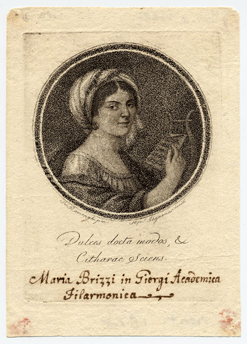It is a rich musical world, that of Bologna in the first
fifteen years of the nineteenth century, made up of great musicians (like
Rossini), theatres for the opera (Communale, Legnani, Formagliari,
Taruffi, Rossi-Marsigli, Corso), academies (in addition to the
Philharmonic, Concordi, Polinniaca, Casino di Diversimento), aristocratic
salons, gazettes for presenting and reviewing musical events. And with a
School of Music, one of the first in Italy not dependent on a religious
institution, founded in 1806 to train future performers with the
highest-level teachers.
In this world so culturally rich stand out some
figures that make the town a renowned venue: among them, Maria Brizzi. The
year 2012 marks the anniversary of the second century of her death.
Her memory was lost along with that of many women organizers, teachers,
composers and performers who have filled the history of music from
medieval times to today.
Maria Brizzi was born August 7th, 1775. She
lived on Via Saragozza in the Palace Albergati with her brothers who
became famous musicians. She studied music and, at only 13, she is already
and organist and choirmaster in an important monastery in Ancona. In
February 1794, she married lawyer Luigi Giorgi and established in her home
(near the Caparra Palace) the Polinniaca Academy, a school of singing and
piano, and a venue for music concerts among the most important in the
city.
She was not only an organizer: she composed music (among other an
anthem for General Bonaparte in
1797, the Cantata for the arrival of Napoleon in 1806, the
music with which the city celebrated the wedding of the Emperor and Maria
Louisa in 1810), but most of all she gave concerts in Italy and in other
countries.
Protagonist in the first concert ever given at the Comunale
in 1808, when the "inimitable piano player ravished stunned and silent
spectators". She accompanied on the piano, in 1811, the memorable
performances of Paganini in Bologna, and was admired in Vienna, as
mentioned by the Editor of The Rhine "where there are still echoes of the
just praise for the sweetest harmony with which Mrs. Giorgi made her laugh
and cry with the mighty and impressive Alemannian music". But, let us come
back to the Academy, where the presence of a distinguished audience
(regular guests were G. Battista Guastavillani, State Counsellor, and S.E.
Caprara, squire of S.M.), performed opera composers like Paisiello, Paer,
Mayr and Cimarosa and foreign authors like Haydn and Beethoven, and where
they performed during memorable evenings reviewed by all the newspapers of
the time "youth of great hope" (like Rossini) and artits of international
repute (like the soprano Isabella Colbran).
A crowning success came
for Maria, in 1806, when she was unanimously appointed to the Philharmonic
Academy an an "inimitable teacher in the art of piano playing", an honour
so much greater, if we think that women academics, performers or composers
are still so rare today. From 1811, the apparitions of Mary in public are
becoming rarer: she is pregnant and sick, but still in the last moments
"volle
sopra un motivo di Paisiello sonare come le succedevano in mente alcuni
affettuosissimi concerti, pieni di malinconia sė dolce che facevano per
tenerezza piangere chi li intendeva: e guardando in lei pur cresceva il
pianto" [on a musical theme by composer Paisiello, she
wanted to play as came to mind dear and wonderful concerts, full of
melancholy so sweet that others who listened shed tears: she too felt the
sorrow rise within].
She
is assisted by two great doctors of Bologna, Gaspare Uttini and Matteo
Venturoli, but nothing could be done: she died on January 14th, 1812, a
few days after having given birth to her daughter.
At the funeral, "one
hundred and five musicians played gracefully and more than a mile out of
town (in such a rigorous season) a multitude accompanied her in
sorrow".
Demonstrations of affection were numerous and lasted a long
time and the commemorations held in the city from all organizations,
involved in music or not, a testimony of what Maria Giorgi had done for
the reputation and the musical culture of Bologna.